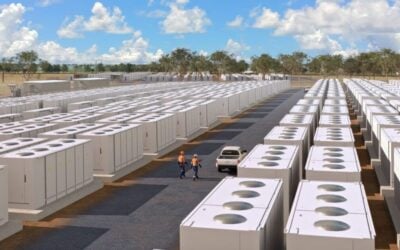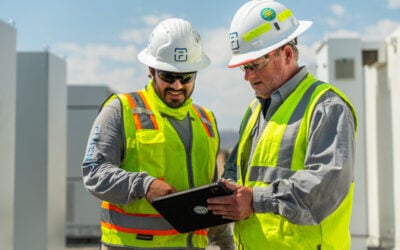A previous off-grid installation in Egypt by Juwi, in Egypt. Image: Juwi.
Australia’s “largest solar and battery storage project to date” will be built by German developer Juwi at a copper and gold mine, with support from public bodies including the country’s Clean Energy Finance Corporation (CEFC).
Also described by Juwi as the biggest hybrid power plant to combine solar, diesel and battery storage in the world so far, 10.6MW of solar and a 6MW battery is to be added to 19MW of existing diesel generation facilities at the DeGrussa Copper-Gold Mine in Western Australia.
Enjoy 12 months of exclusive analysis
- Regular insight and analysis of the industry’s biggest developments
- In-depth interviews with the industry’s leading figures
- Annual digital subscription to the PV Tech Power journal
- Discounts on Solar Media’s portfolio of events, in-person and virtual
The solar will provide an unspecified majority portion of the mine’s daytime electricity, with CEFC claiming the energy generated by over 34,000 PV panels will reduce diesel consumption by about five million litres each year. This is equivalent to a reduction of over 20% in diesel use, Juwi said.
CEFC boss Oliver Yates called the installation, for the mine’s owner Sandfire Resources, “an important project showing the significant potential for off-grid renewables in regional and remote Australia”.
“The solar and battery storage combination offers the opportunity to reduce the reliance on diesel-powered energy in remote area mining,” Yates said.
Abbott's axe
Policy uncertainty over renewable energy in Australia has been a controversial and well-reported subject, with prime minister Tony Abbott’s government taking steps such as implementing a lowered renewable energy target (RET) and this week making a fresh attempt to block CEFC from making planned investments in rooftop solar and wind projects.
One outspoken critic of the government’s stance on renewables is John Grimes, head of the Australian Solar Council and latterly also of the country’s Energy Storage Council. As well as making a call this week in the Guardian newspaper to oust the government using marginal seats, Grimes has previously written in a blog for PV Tech Storage about the economics of solar-plus-storage in Australia. In it, Grimes argued that the business case for replacing fossil fuels in remote and off-grid locations is already good enough that such projects will continue to be deployed, regardless of Abbott’s attempts to swing the axe.
CEFC pointed out in a statement that using diesel alone, energy used to power remote and off-grid mining operations can constitute approximately 30% of operating costs. Replacing some of that with solar and storage can help offset “rising production costs, global competition and the drive to improve overall environmental performance,” CEFC wrote.
CEFC will lend up to AUS$15 million (US$11.2 million) to finance the DeGrussa mine project, with AUS$20.9 million of the total AUS$40 million cost to be provided as a grant from the Australian Renewable Energy Agency (ARENA). French independent energy company Neoen has acquired the project and will contribute an equity investment to make up the remainder. Sandfire will purchase energy from Neoen at a fixed rate through a power purchase agreement (PPA).
Also Juwi’s first major project in the country, the German company will develop, build and operate the solar and battery part of the system, assisted by local survey and infrastructure company OTOC, which will be responsible for online assembly. The plant is scheduled to become operational early next year.
In commenting on the news, managing director for Neoen’s Australian subsidiary Franck Woitiez talked up the value of such projects, and namechecked the Philippines as another region where there could be potential for development.
“Australia, and other countries such as the Philippines, offer great potential for development of such facilities, to replace an increasing amount of diesel consumption. Sandfire showed a major commitment to the project and we believe it will undoubtedly inspire other mining companies,” Woitiez said.
Meanwhile, ARENA chief Ivor Frischknecht pointed out that as much as 1.2GW of diesel generation is currently in use at mines in Australia.
"Remote industries in Australia currently rely on 1.2GW of power from diesel fuel that is prone to price volatility and supply interruptions. Renewables are already competitive with fossil fuels in many off-grid applications, offering a strong, secure and reliable alternative to trucked-in diesel," he said.






